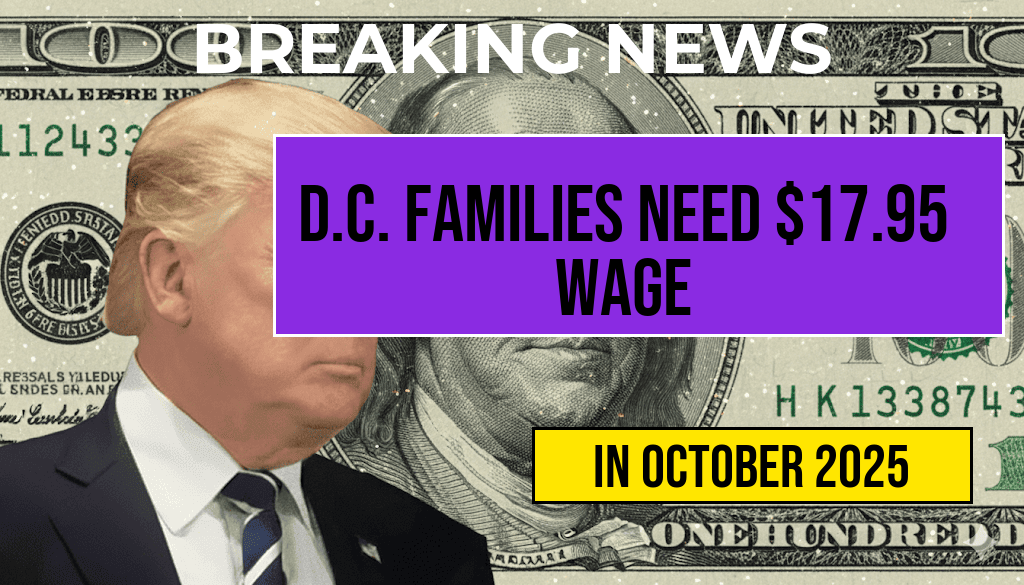For families in Washington D.C., reaching a comfortable standard of living requires a significantly higher minimum wage than many assume. Analysis indicates that a $17.95 hourly rate is necessary for full-time workers to earn approximately $3,111 per month before taxes—an income level that helps cover basic expenses such as housing, transportation, and groceries in the nation’s capital. With the city’s cost of living among the highest in the country, families depend on wages well above the federal minimum to meet their financial needs. This data underscores ongoing debates about wage policies and affordability in urban centers, where housing prices and living costs continue to outpace growth in lower wage brackets. As policymakers consider adjustments to minimum wage laws, understanding the income threshold required for a modest but stable lifestyle remains crucial for shaping equitable economic strategies in D.C.
The Cost of Living in Washington D.C.: An Overview
Housing Expenses Drive Up Living Costs
Housing costs in Washington D.C. are among the highest nationwide. According to recent reports from the Zillow Research Center, the median rent for a one-bedroom apartment exceeds $2,200 per month, with median home prices well above $600,000. These figures make affordable housing a significant challenge for many residents, especially those earning minimum wage or slightly above.
Transportation and Daily Expenses
Public transportation costs, including Metro fares, add to the financial burden for daily commuters. A monthly Metro pass costs approximately $81, but for families relying on multiple vehicles, expenses can escalate quickly. Groceries and healthcare services also reflect D.C.’s high living costs, further elevating the income needed to maintain stability.
Minimum Wage Calculations and Income Needs
Determining the $17.95 Threshold
| Hourly Wage | Weekly Hours (40 hours/week) | Gross Weekly Income | Gross Monthly Income (4 weeks) |
|---|---|---|---|
| $17.95 | 40 | $718 | $2,872 |
| $19.50 | 40 | $780 | $3,120 |
To reach a pre-tax monthly income of roughly $3,111, a worker needs to earn just under $20 per hour, assuming a standard 40-hour workweek. The $17.95 figure appears to be the minimum wage required for a full-time employee to approximate this income, considering some variability in hours worked or additional benefits such as overtime or bonuses.
Implications for D.C. Families and Policy
Living Wage vs. Minimum Wage
While the federal minimum wage remains at $7.25 per hour, localities like D.C. have adopted higher standards. The District’s minimum wage has steadily increased over recent years, reaching $16.10 in 2023, with plans to raise it further. Local policymakers aim to reach $17.50 by 2026, aligning more closely with the income needed for basic family expenses.
Economic Challenges and Income Inequality
Despite these increases, many families still struggle to cover essential costs. The disparity highlights the ongoing need for comprehensive economic policies that address affordable housing, transportation subsidies, and healthcare support. Experts suggest that wages must not only rise but also be paired with targeted social programs to ensure economic stability for working-class families.
Broader Context and Future Outlook
Comparing National and Local Wage Policies
Washington D.C.’s approach reflects a broader national trend toward localized minimum wage adjustments, recognizing that federal standards alone may not suffice in high-cost urban environments. Cities like San Francisco and New York have implemented similar measures, acknowledging that living wages are essential for workforce retention and economic fairness. According to Wikipedia’s overview of U.S. minimum wages, these local policies are vital tools for addressing income disparities.
Projected Trends and Policy Debates
As economic pressures persist, debates continue over the appropriate level of minimum wages and the role of government in supporting working families. Advocates emphasize that wages should reflect the true cost of living, while opponents often raise concerns about potential impacts on employment. The consensus among many economists suggests that a balanced approach, combining wage increases with affordable housing initiatives, offers the best path forward for D.C. families seeking financial stability.
Frequently Asked Questions
What is the current minimum wage required in D.C. for families to earn a monthly income of $3,111 before taxes?
The minimum wage in D.C. for families to earn a monthly income of $3,111 before taxes is $17.95 per hour for full-time work.
How many hours per week does a full-time worker need to work at $17.95/hour to reach the $3,111 monthly income?
A full-time worker would need to work approximately 40 hours per week at $17.95/hour to earn a monthly income of $3,111 before taxes.
Why is the minimum wage of $17.95 significant for D.C. families?
The minimum wage of $17.95 is significant because it is the rate needed for D.C. families to achieve a comfortable monthly income of $3,111 before taxes, supporting their basic needs.
Does the article discuss tax implications on the monthly income earned at this wage?
Yes, the article mentions that the $3,111 is the pre-tax income, and actual take-home pay will be lower after taxes are deducted.
How does this minimum wage compare to the federal minimum wage?
The $17.95 hourly rate is higher than the federal minimum wage of $7.25, reflecting the higher cost of living in D.C. and the need for a higher living wage.

Leave a Reply